For years, one of the biggest hassles for foreigners residing in Beijing was dealing with registering at their local police station every time they entered China.
In addition, any family or friends coming to stay with them would have to be escorted to these often-unstaffed offices within 24 hours of their arrival to struggle through the required accommodation registration process right after making their journey east.
However, since the Exit-Entry Administration Department set up their online registration system, a trip to the nearest police station often just results in a non-English speaking staff member trying to guide you through the digital system – so, best to skip the trip to the po-po depot and do it all online!
Visitors who are staying in a hotel need not worry about this process, as your hotel will handle your registration for you, but this guide provides step-by-step instructions for hassle-free (-ish?) online registration for foreigners staying in private accommodations.
Step 1
On your phone or computer, go to the government-run website https://zwfw.gaj.beijing.gov.cn/zsdj/zsdj-w/, or scan the QR code below within 24 hours of your arrival.

The system is available in Chinese, English, Korean, German, French, Russian, Spanish, Arabic, and Portuguese.

However, despite the main portions of the form appearing in the other language options, certain fields of the form still only have Chinese characters, but we will cover the most confusing of those in this guide.
After agreeing to the Chinese law provisions 'Notification,' you will be taken to the ‘Sign-up/Login’ page.

Here is the main catch: Same as registering at a police station, it requires a Chinese mainland mobile number as a contact.
However, just as at the station, visitors without their own Chinese mainland SIM card can use the phone number of the person they are staying with to have them register on their behalf.
To login to the system, you or your host will have to provide a Chinese mainland mobile number, fill in the four-digit CAPTCHA (Completely Automated Public Turing test to tell Computers and Humans Apart–in case you didn’t know what that stood for) number, and enter the six-digit verification code sent by SMS.
Step 2
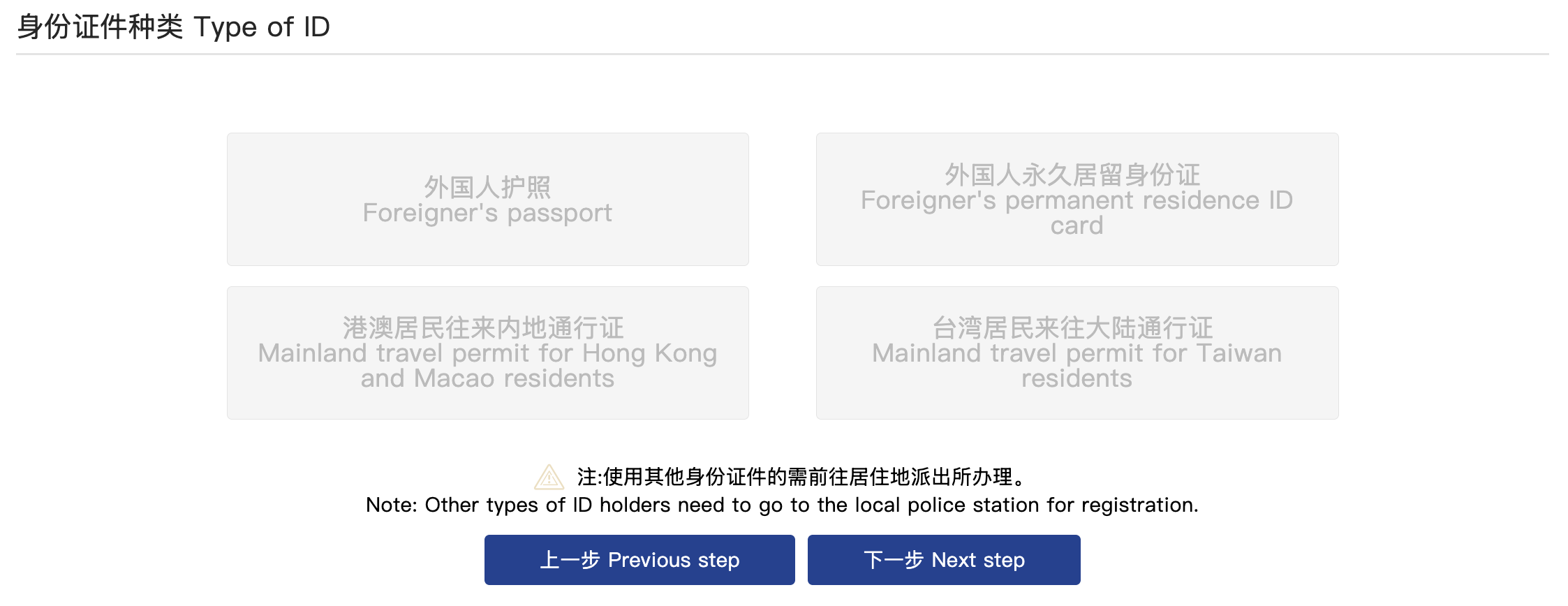
You will then be asked to select which type of ID you will be using for your registration, which for most visitors will be ‘Foreigner’s passport.’
Four kinds of entry-exit identity documents are accepted: a Foreign Passport, a Foreign Permanent Resident ID Card, a Mainland Travel Permit for Hong Kong and Macao Residents, and a Mainland Travel Permit for Taiwan Residents–unless you have one of these, you'll still need to register in person at a police station.
Step 3
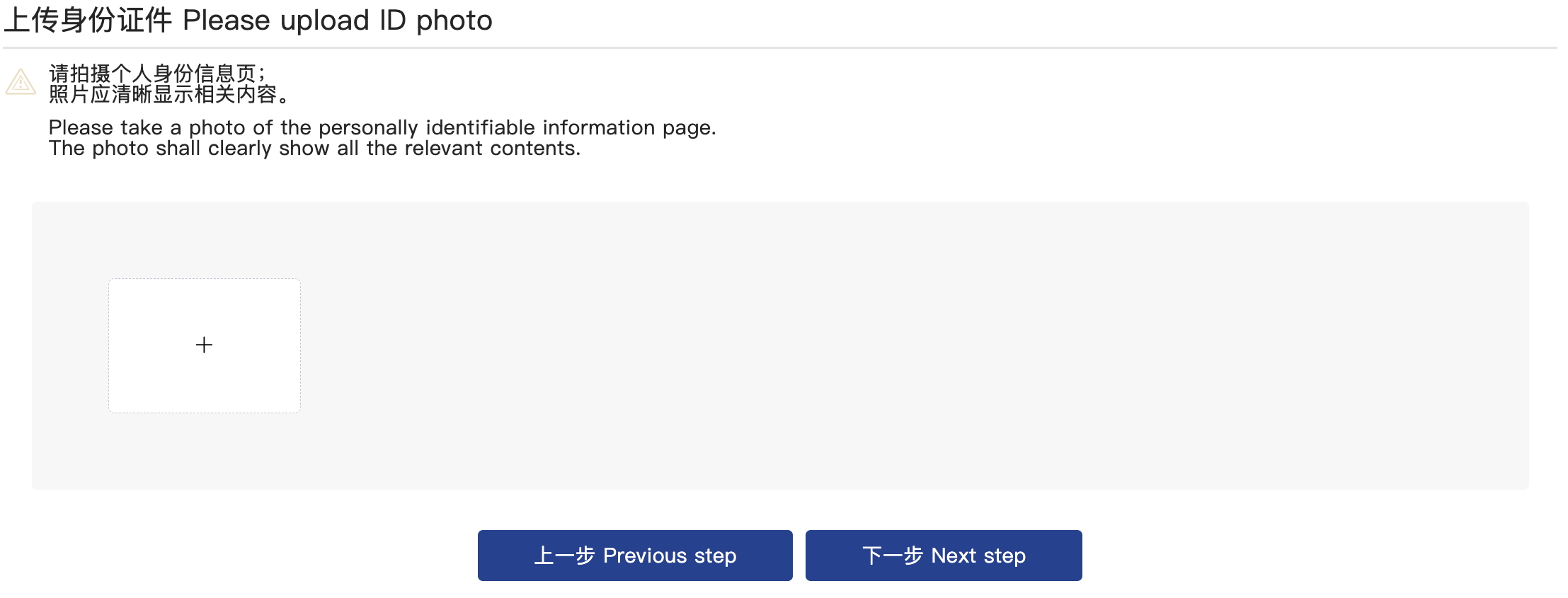
You will then be asked to upload a photo of your ID that clearly shows all of your identification information.
Step 4
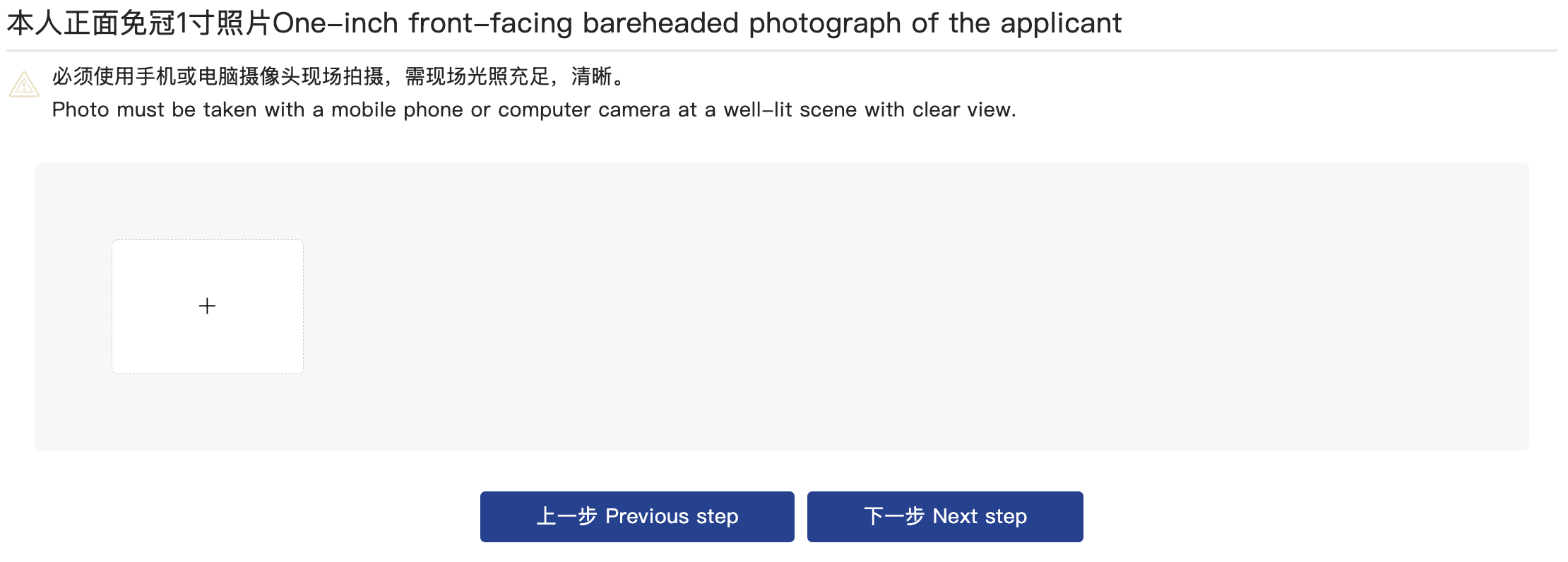
You must then provide a well-lit, one-inch, front-facing, bareheaded photograph taken with a mobile phone or computer camera to verify your identity (essentially a photo that meets the basic passport/visa requirements).
If you have already registered through the system before, you may get a rejection notification–don’t worry, it’s not because you look terrible in the latest image you tried to upload.
Attempt pressing the ‘Next step’ button anyway–it is likely just telling you the system already has your image stored and is saying you have reached your ‘upload limit.’
Step 5
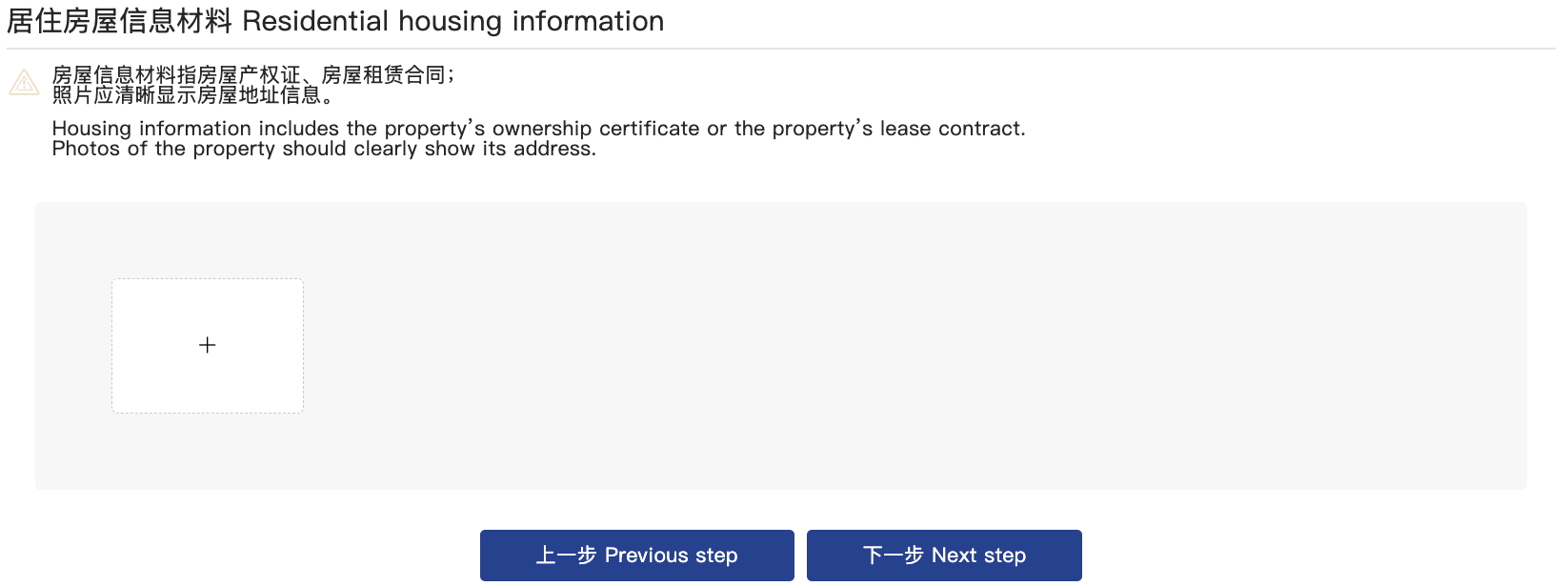
The next step requires you to provide the residential housing information for the domicile in which you will be staying, whether it be your own apartment or the accommodation of the person you are staying with in Beijing.
Housing information includes the property’s ownership certificate or the property’s lease contract–either one must clearly show the address.
Step 6
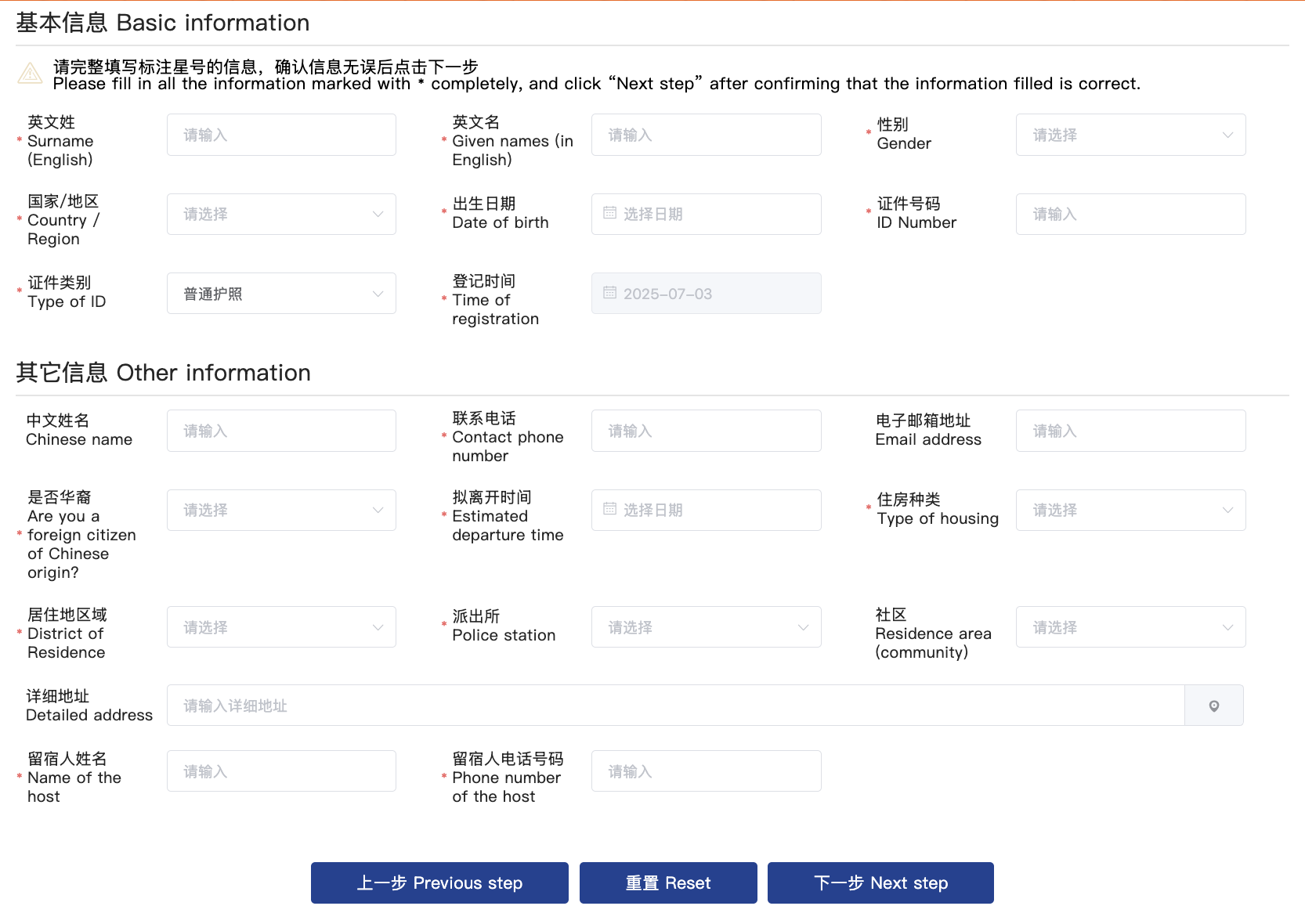
After each of the previous requirements has been accepted, the portal will ask for your basic information.
This includes your name, ID number, gender, date of birth, etc.
Most of the fields, like gender, have options in both English and Chinese.
Others oddly only have the options in Chinese, such as ‘Type of ID’ and ‘Are you a foreign citizen of Chinese origin?’–we have highlighted the most common answers in the images below:
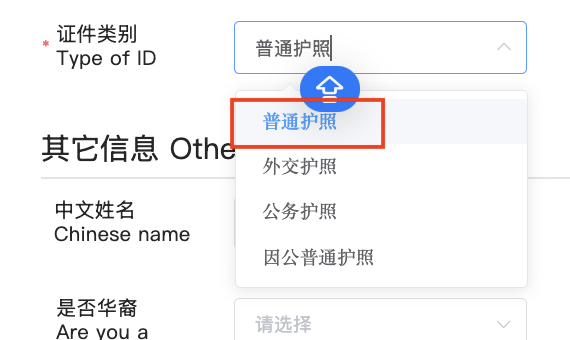
The first option for 'Type of ID' is 'regular passport'
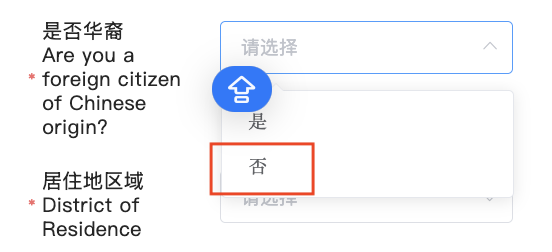
The bottom option for 'Are you a foreign citizen of Chinese origin?' is 'no'
One of the trickier points is figuring out which police station you should be registering with; after selecting your ‘District of Residence’, you must choose the police station attached to the address you are staying at.
If you are not sure, you can ask your host or landlord–whether you are staying with friends, family, or renting an apartment–they should know the location of the nearest police station or foreigner services station in their area.
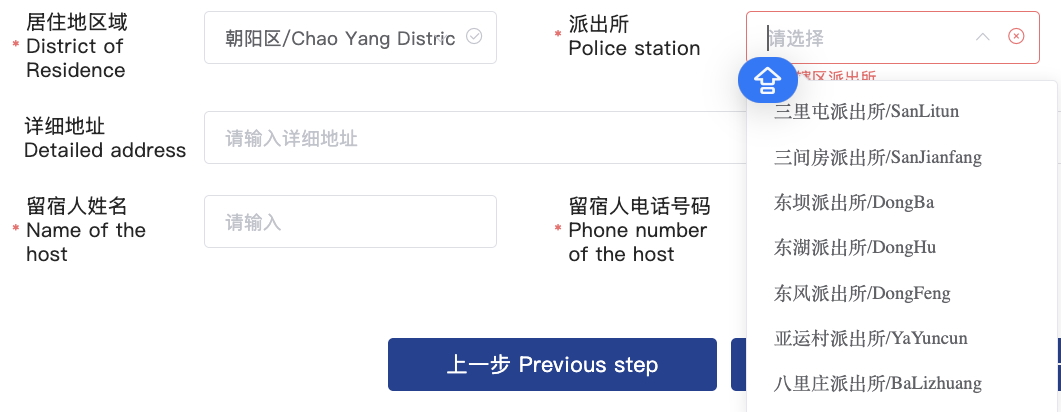
Each district has designated police stations for different areas
Alternatively, utilize the management office of the complex you are staying in.
If you're residing in an apartment complex, the management office (物业 - wùyè) should have information regarding the local police station you need to register with.
After you fill in all the required information and press ‘Next step,’ you will get a ‘Submission successful’ notification, and then you must wait approximately 24 hours for your information to be reviewed.

Step 7
You will receive an acceptance or rejection notification by SMS and E-mail, depending on the contact information you provided.
If you get a notification saying that your accommodation registration was rejected, you can log back in to the system and press the 'Check' option on your submission.

The website will inform you which data entry points did not meet the requirements.
You can then edit your existing application to meet the requisites.
There is some leniency regarding the 24-hour registration rule for applicants who attempted to comply on time with the rules, so it’s better to try and fail than not try at all!
Despite the multiple steps of this seemingly complex process, we can tell you from experience that it is better to register online than to go to the police station.
The local government is trying to push this new system and will likely ask you to go through this process on your phone when you show up at the registration station.
We would not have recommended this method to you last year, but the system has already gone through its ‘beta’ phase and is now a convenient and efficient way to register when you re-enter Beijing or bring a visitor to this fascinating (but still a little bit complicated) city.
[All images/screenshots are by Yinmai O’Connor/That’s]























0 User Comments